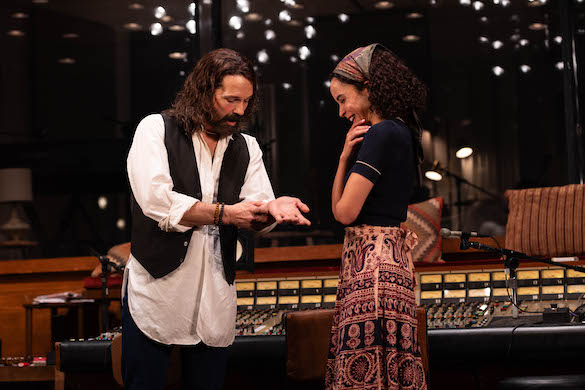Fans of Fleetwood Mac’s ‘Rumours’ May Enjoy Its Echoes in a New Play, ‘Stereophonic’
While the playwright has disputed the notion that his work, featuring songs by a former member of the Arcade Fire, is a docudrama of the fraught story of the making of that album, many details of his production say otherwise.

In 1976, members of a U.K.-born band, Fleetwood Mac, gathered at Sausalito, California, and Los Angeles to record one of the most exquisite pop-rock albums ever produced, “Rumours.” The group’s lineup, which had evolved since its inception nearly a decade earlier, now included two Americans, a brilliant singer/songwriter/guitarist, Lindsey Buckingham, and a songwriter who was one of her generation’s most distinctive vocalists, Stevie Nicks, who would soon launch a successful solo career.
Mr. Buckingham and Ms. Nicks were lovers, and keyboardist/singer/songwriter Christine McVie and bass guitarist John McVie were married. But both couples had essentially come apart when the album was being made; the drummer, Mick Fleetwood, was apparently having his own marital problems, and the collective tension was by all accounts exacerbated by creative conflicts and liberal drug use.
Playwright David Adjmi has disputed the notion that his new work, “Stereophonic,” which features songs by a former member of the Arcade Fire, Will Butler, is a docudrama of this fraught, storied scenario. Yet all the details laid out above, down to the instruments played, plainly informed the piece, as did other bits of Mac-lore — albeit with the names changed to protect the not-so-innocent.
In his playbill notes, which point to a Led Zeppelin song as a source of inspiration, Mr. Adjmi describes “Stereophonic” more generally as “a love letter to artists: to the intransigent, insane love that fuels our work and the heartbreak we endure to keep making it.” That the play is — though I suspect my nearly lifelong love for “Rumours” helped sustain me through the three hours the playwright devotes to his mission.

Under Daniel Aukin’s witty direction, that length serves to reinforce the sense of drudgery and claustrophobia that descends on the characters over time, even in the spacious, well-appointed recording studio crafted by scenic designer David Zinn. A pair of young engineers played by Eli Gelb and Andrew R. Butler serve as a sort of geek chorus, alternately interacting with and dishing about their rock-star employers. “You have to anticipate problems before they happen,” Mr. Gelb’s Grover tells his partner early on.
And, boy, do they happen. Bass guitarist Reg, who’s imbued with droll aggression by a typically fine Will Brill, repeatedly rolls into the studio late and hungover, to the plain disgust of his elegant wife, Holly, crisply played by Juliana Canfield. Peter, a temperamental visionary, perfectionist, and egomaniac — qualities adroitly captured, sometimes to comic effect, in Tom Pecinka’s performance — clashes with the superficially breezy but haunted Diana, played by an endearing Sarah Pidgeon, and everyone else.
As Simon, Chris Stack, evoking a young Mr. Fleetwood down to his mop of dark hair and beard, proves the most light-hearted of the bunch; when he does lose his composure, during a prolonged technical disagreement, it’s a welcome moment of levity.
While “Stereophonic” isn’t a musical, Win Butler’s songs do much to reflect and enhance both the camaraderie and the friction central to the proceedings. Seguing between folky acoustic numbers and muscular, chiming showcases, with glowing vocal harmonies and soaring guitar parts, the tunes certainly echo the spirit of “Rumours” — though, to be fair, these elements can be found on other great recordings of that era.
In fact, were an original cast recording of “Stereophonic” to be released, I’d be among the first to add it to my playlist. If the songs, after repeated listens, didn’t match the extraordinary pop savvy of those on “Rumours,” I’d like to think the composer didn’t suffer for his art quite as much as the creators of that album allegedly did.
Correction: Will Butler is the name of the songwriter. The name was incorrect in an earlier version.

